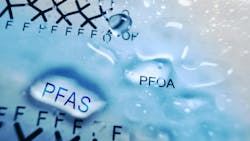Purdue researchers develop rapid PFAS screening and replacement method
Purdue University scientists have unveiled a new patent-pending method to accelerate how per- and polyfluoroalkyl substances (PFAS) are screened, modified, and replaced with safer alternatives—potentially advancing efforts to reduce “forever chemical” pollution in water systems.
Led by Christina Ferreira, research assistant professor in Purdue’s Bindley Bioscience Center, the multidisciplinary team created a process that can quickly generate and analyze hundreds of PFAS-like compounds while identifying which are less harmful and more degradable. The study, published in Environmental Science & Technology Letters, describes a workflow that is “hundreds of times quicker” than traditional chemistry, Ferreira said.
“Our new method employs a multiuser platform developed at Purdue that is accessible to any researcher to detect, chemically modify or evaluate how these chemicals impact biological systems,” Ferreira said in a press release. “The Purdue method also opens a door into making tools that chemically transform PFAS and break them down.”
Using Purdue’s high-throughput desorption electrospray ionization mass spectrometry (HT DESI-MS) platform, the team screened more than 1,000 reactions in a matter of hours, producing 915 new PFAS-like molecules while generating minimal waste. The process enables researchers to analyze chemical structures in seconds and predict electronic properties such as reactivity and degradability.
Ferreira said the approach combines rapid synthesis, advanced spectrometry, and computational modeling to pinpoint promising PFAS alternatives that could be less persistent in the environment. “This helps design non-regrettable PFAS replacements for industrial use, build better chemical libraries for pollution detection and even support future cleanup strategies,” she said.
Purdue has filed a U.S. patent application for the technology through the Purdue Innovates Office of Technology Commercialization, with opportunities open for commercial partners to advance its development.
